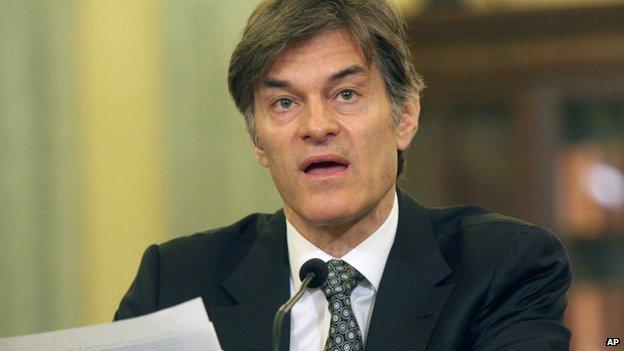Senators question Dr Oz's science
- Published
- comments

Dr Mehmet Oz tells a Senate committee he acts as a cheerleader for his television audience
Nearly a decade ago, Dr Mehmet Oz was a celebrity surgeon with golden credentials. Soon after he started appearing on his friend Oprah Winfrey's show, however, "Dr Oz" became an influential household name across the United States.
His own self-titled show, which launched in 2009, is one of the most highly rated , external on television, with an average of four million viewers a day. As his name has grown in popularity, however, so has his marketing ability - and many critics say that the "medical miracles" Dr Oz endorses are little more than snake oil.
At a Senate committee hearing, external this week, Dr Oz came under fire for his endorsements of weight loss products and nutrition supplements - many of which are not backed by research and lack FDA approval.
In her remarks, Democratic Senator Claire McCaskill did not shy away from her own scepticism.
"When you feature a product on your show, it creates what has become known as 'Oz Effect,' dramatically boosting sales and driving scam artists to pop up overnight using false and deceptive ads to sell questionable products," she said, external.
"I'm concerned that you are melding medical advice, news and entertainment in a way that harms consumers."
Dr Oz did not back down under Ms McCaskill's berating questioning. He said he "personally believes" in the the products he presents on his programme:
I passionately study them. I recognise that oftentimes they don't have the scientific muster to present as fact. But, nevertheless, I give my audience the advice I give my family all the time.
He explains that he sometimes uses "flowery language" in an attempt to keep viewers interested.
"My job, I feel on the show, is to be a cheerleader for the audience," he said. "And when they don't think they have hope, when they don't think they can make it happen, I want to look and I do look everywhere, including alternative healing traditions, for any evidence that might be supportive to them."
In the National Journal, Brian Resnick spells out what he sees as a glaring ethical dilemma.
"Basically, Oz is saying that even if the science is dubious, if he believes in the 'thumbnail sketch' of the preliminary evidence, he'll present it to viewers as a solution to a problem," Resnick writes, external. "But it isn't science. And given his visibility in homes across the country, businesses will be sure to continue to use his not-quite-scientific endorsements to sell products."
But his enthusiastic endorsements of questionable products may have been the secret to his success, says, external Forbes's Matthew Herper.
"The big question, to me," he writes, "is whether that man, the surgeon who, after years of cracking people's chests, gives it to the audience straight and gross and gory and scares them with the reality of their biological selves, whether that guy could have succeeded on TV without all the appeals to energy fields and homeopathy and a new 'miracle' supplement every week."
The Daily Beast's Russell Saunders is more blunt, external:
As a physician, Dr Oz's credentials are truly impressive. He is the vice-chairman of surgery at one of the nation's top medical schools, after all. But somewhere along the way he decided that his fame was more important than his credibility, as demonstrated by his willingness to promote treatments that fail to withstand even the barest scientific scrutiny.
Although the Senate committee's scepticism may influence public opinion, it remains unclear whether their words will change Dr Oz's promotional ways.
Science-Based Medicine's Scott Gavura says, external, "What's most ironic about Oz is that notwithstanding his weak acknowledgement of the problem with his hyperbole, he still sees himself as the victim. He's not going to stop his breathless endorsements and quick fixes."
(By Annie P Waldman)